- Home
- A. S. Byatt
Angels & Insects: Two Novellas Page 28
Angels & Insects: Two Novellas Read online
Page 28
Thy blood, my friend, and partly mine;
For now the day was drawing on
When thou shouldst link thy life with one
Of mine own house, and boys of thine
Had babbled ‘Uncle’ on my knee;
But that remorseless iron hour
Made cypress of her orange flower,
Despair of Hope, and earth of thee.
I seem to meet their least desire,
To clap their cheeks, to call them mine.
I see their unborn faces shine
Beside the never-lighted fire.
And these unborn children, with terrible energy, haunted her and her own two sons, named as they were for the dead, the younger, Eustace, for her uncle Charles’s lost son, and the elder, Arthur Hallam Jesse, for Arthur. But it had not come about as she had hoped. Those shining unborn angel-faces were brighter in the world’s eye—and in her own, in dark moments—than the poor, mundane, anxious little face of Arthur Hallam Jesse, handsome though he was. He was an awkward living evidence of the failure of perpetual maidenhood, and she herself was uneasy with him and knew that he knew it, that he thought her cold. Alfred’s poem had no place for Arthur Hallam Jesse, though it ended with a celebration of a wedding, an ambiguous assertion of the power of life over death, an invocation to a new soul to ‘draw from out the vast / And strike his being into bounds’. Alfred had passed over her own inconvenient wedding to celebrate that of her sister Cecilia to Edmund Lushington, an Apostolic friend of himself and Arthur,
worthy; full of power;
As gentle; liberal-minded, great,
Consistent; wearing all that weight
Of learning lightly like a flower.
Here too, she and Arthur had been briefly united in Alfred’s words
Nor have I felt so much of bliss
Since first he told me that he loved
A daughter of our house; nor proved
Since that dark day a day like this.
He could hardly have celebrated her own wedding-day, which preceded Cecilia’s by a few months, with such roundness and perfection. But he had somehow managed to undo it completely, as though it had not been, as though these vows had not been spoken, and those children not engendered in which A. H. H.’s soul might possibly find a convenient new house.
Now waiting to be made a wife,
Her feet, my darling, on the dead;
Their pensive tablets round her head,
And the most living words of life
Breathed in her ear. The ring is on,
The ‘wilt thou’ answered, and again
The ‘wilt thou’ asked, till out of twain
Her sweet ‘I will’ has made you one.
Nor count me all to blame if I
Conjecture of a stiller guest,
Perchance, perchance, among the rest,
And, though in silence, wishing joy.
She loved Cecilia too. Cecilia’s lost children approached from the spirit world through the voices of Sophy Sheekhy and Mrs Papagay. Cecilia’s marriage had been happy, but the boy Edmund, the child invoked into being in the poem, had died long ago, aged thirteen, followed by his two sisters Emily and Lucy, over the slow years, at nineteen and twenty-one, breaking poor Cecilia’s heart. But even Cecilia, kind Cecilia, conventional Cecilia, had not managed to love Richard, had been heard, after one of his visits, to express fear that he would become a ‘permanent fixture’. Just as Richard the sailor had a strangely simple absence of fear, so Richard the social being had a strangely simple unawareness of other people’s sentiments, or irritability, or reserve. He talked on, saying what he thought, what he felt, as though everyone lived comfortably in some open, bright, evenly lit place where things were exactly as they appeared to be, and he drove people mad. Or so Emily observed when she chose to. Mostly, she didn’t. She encased herself in her private aura of mixed eccentricity, lingering tragedy, and finicking attention to Pug and Aaron.
If it had not been for Richard’s unawareness and absence of fear, perpetual maidenhood might well have been her fate and future, and she would have been hallowed and cherished. She had not ‘fallen in love’ with Richard all at once, as she had in a sense with bright Arthur in the Fairy Wood. Arthur compared her to ‘a trembling flower, or a being, like Undine herself, composed of subtler elements than common earth’. Richard sat opposite her in the Hallams’ dark, panelled dining-room, like a young man turned to stone by a genie, his heavy silver knife and fork suspended between his mouth and his fricassee of chicken, staring abstractedly, as though, she told him later, he was trying to work out a difficult equation. Someone said, ‘What has caught your attention, Mr Jesse?’ and he answered simply, ‘I was thinking how very lively and handsome Miss Tennyson looks in the candlelight. I never saw a more interesting face.’
‘That is a compliment indeed,’ the someone said. It was Julia Hallam, and it was said with a touch of lemon-juice, Emily thought, remembering how she had turned her own eyes down towards her own chicken, wondering if she had smiled too broadly, or been forward in some way.
‘Not a compliment,’ persisted Richard. ‘What I think. What I really think. I’m not in the habit of paying compliments.’
And he went back to his attitude of contemplation, to the suppressed amusement of his neighbours, so that his chicken was quite cold, and the other guests had to wait for him to finish. Ellen and Julia quizzed Emily later in the evening, about ‘having made a conquest, my love, of that gawping Midshipman,’ and Emily giggled with them, and said that making conquests was not in her thoughts. But she liked Richard for admiring her—how could she not—even if his admiration was an embarrassment. She was pleased one day when he came up behind her in Wimpole Street, and fell into step with her, talking peacefully about the difficulties of life in London compared to his Devonshire home, putting a large, firm hand under her elbow, saying, as they parted at the door of the circulating library where she had been going, ‘I didn’t mean to embarrass you, Miss Tennyson, at dinner. I didn’t, truly. I said what carne into my head. I do that, it causes me no end of trouble in my life, always in scrapes and talking myself out of muddles I need never have got into, but it was true what I said, I do most greatly admire you, and I am not given to complimenting ladies. I don’t see many, and to tell you the truth, none has ever much interested me before. But you do. You do interest me.’
Thank you, Mr Jesse.’
‘No, don’t look all prim and confused, now, I didn’t mean to put you in a twitter. Why are simple things always such an intricate muddle, I wonder? I wanted to tell you, simply, I do admire the way you have overcome your great grief—’
‘I fear I have not, nor shall not.’
‘Not overcome, exactly, that was the wrong word, no, but how much you are alive and—and vital, Miss Tennyson, it is an inspiration.’
‘Thank you.’
‘You don’t seem to understand. I didn’t mean to speak so much so soon, but there I go, rushing on, like the North Wind, can’t stop—have you ever felt that someone was to do with you, when you saw them, quite simply, just that, that there are people all over the place with noses like dough-buttons and eyes like currants and other people like Roman busts, you know, and then suddenly you see a face that’s alive—for you—and you know it’s to do with you, that that person is a part of your life, have you ever felt that?’
‘Once,’ said Emily. ‘Once, I believe.’ Had she? They stood in the street and looked at each other. Richard’s bland, amiable brow was crumpled with his puzzled attempt to make her share what was perfectly plain to him. He made an awkward movement with his arms, half a salute, half the prelude to enfolding her, and drew back.
‘I’m crowding you, Miss Tennyson, I’ll go now, I hope you’ll talk later and not hold my awkwardness against me. If I’m right, we do have things to say to each other, and if I’m not, it will become clear enough, no bad feelings, won’t it? So I’ll bid you goodbye for the present, Miss Tennyson. It’s been a ple
asure.’
And he strode off, very fast, down the street, leaving her not knowing whether to laugh or cry.
He had persisted, single-minded, and apparently oblivious of anything ridiculous in his courtship. He had accompanied Miss Tennyson to museums and parks, had sat, too large for his chair, manhandling china teacups, listening to the Hallams discussing what Arthur would have been, and nodding sagely, and staring at Emily. Emily herself had looked back between the ringlets, still glossy and multitudinous. Ellen and Julia characterised the long face as vacuous, stupidly amiable. Emily was principally struck by its kindness. There appeared to be no malice in Richard Jesse, which made other people’s minor mockeries of him seem to her cruel and disproportionate. She found also, as she looked, that she liked parts of him in a bodily way that it was not decent to speak of. He had good brows. His mouth was a good shape. His tall back and long taut legs were elegant and strong. There was something strong also about the hands which chattered teacups in their saucers but which were doubtless—she had begun to try to imagine his life—different with ropes in a blizzard. She told herself he was a man of action, not of words, despite the constant steady flow of his undirected talk, and compared him to Miss Austen’s naval heroes. Arthur had sent her Emma, which she loved, but her secret favourite among Miss Austen’s works was Persuasion, the story of a woman not in her first youth, set aside as an old maid, who loved a sea captain, and declared, ‘All the privilege I claim for my own sex (it is not a very enviable one: you need not covet it) is that of loving longest, when existence or when hope is gone!’
He proposed to her in the Hallams’ house, untroubled by any feeling of delicacy about choosing ground on which Arthur might have walked, or addressing a lady who sat in a dark leather armchair in which Arthur might have sat. Old Mr Hallam’s history books loomed above them, dusky, leathery and dark. A wintry light came in from the street, Alfred’s ‘long unlovely’ Wimpole Street, where he had waited with beating heart for ‘a hand that can be clasped no more’. Richard pulled his chair nearer to Emily’s, making a grating sound on the polished floor. She clasped her hands together on her knee, feeling Arthur’s ring cut her fingers.
‘I have something to ask you,’ said Richard Jesse. ‘I don’t find it easy to see you alone, and I am oppressed by the idea that the ladies of the house might return at any moment. So I will be brief—don’t laugh, I am able to be brief when it’s a question of urgent action, I can be quick enough when a ship’s going aground, or a squall’s setting in—’
‘A curious metaphor,’ said Miss Tennyson, looking at him with her head on one side. ‘Are we going aground or in danger of shipwreck?’
‘I hope not. There I go again. You know what I have to say, don’t you? I want to ask you to be my wife. No, don’t rush into speaking, I know what you have to say, too. But I do believe you could be happy, with me. And I know I could, with you. You are not a comfortable person, I wouldn’t say that, you are all full of fits and starts and little dramas, and I don’t believe you have all that much commonsense, to be truthful, but, you know, I think we go well together, I think we are what each other needs. If a member of the Tennyson family can bear to hear a proposal from anyone who can commit that gawky kind of sentence. Maladroit,’ he said, finding a better word. She opened her mouth.
‘No,’ he said, ‘don’t speak. I know you are going to say no, and I can’t bear it. Think, please, consider it, think, and you will see it will do capitally. Oh please, Miss Tennyson, think of me.’
Emily was touched. She had a prepared little speech, truthful as far as she had thought it out, about how a great love burns one out. She even had a line of Donne, ‘But after one such love, can love no more.’ She believed it. She believed it. Richard Jesse put one great hand over her two hands and one finger of the other to her lips.
‘Don’t speak,’ he said.
She could not lift her hands to move his finger. When she tried to move her lips to speak she found she was in some way kissing the large forefinger. She opened her eyes very fiercely and stared into his, intent, blue, determined. She wanted to say, ‘You look like a pirate boarding a brig,’ but couldn’t speak. She shook her head angrily from side to side. Her hair rustled silky on her shoulders. He picked up a tress of it, with the offending hand. ‘Lovely,’ he said. ‘The most beautiful I’ve ever seen.’
‘You are very foolish,’ said Emily, shaken and disturbed. “I am over thirty years old. I am not a young girl. My days of loving are over. I am resigned to a single life. I am—I am unable to feel.’
‘I don’t think so.’
‘All those years, I have felt like a stone. I am worn out with feeling. I do not want to feel any more.’
‘I don’t think so. I know you’re not a young girl. You’re older than I am, we both know that, no need beating about the bush. Young girls are boring, fizzing kinds of things, all froth and fuss and romantic notions. Whereas you are a real woman, Miss Tennyson. You ought to be a wife. You aren’t cut out to be a maiden aunt, I know, I’ve watched you ever so sharply. I know you think you ought, but you haven’t thought of me, have you? You didn’t expect me, did you?’
‘No,’ said Emily, in a small voice. ‘I didn’t.’
Something black and cruel in her wanted to puncture his precarious self-confidence, to slap him down, to mock, to hurt. And something else wanted to make him happy, to protect him from just such savagery, of which he seemed so blithely unaware. She said, ‘My heart was sealed up, Mr Jesse, when Arthur died. I loved him completely and lost him. That is my history. There can be no more, for me as for him.’
‘I don’t mind your having loved him,’ said Richard Jesse. ‘If you loved him so well, it only proves you can love well and be faithful—as I know I can, though untested as yet. We will not forget him, Miss Tennyson, if you marry me—the love can persist. I honour you, I truly honour you, for its depth and constancy.’
‘Maybe you only want to marry me because of that, because of him. Maybe you see me as an object of pity—I know you are kind, I do know you are kind. I don’t require to be rescued.’
‘Damn it, it isn’t rescue. Can’t you see that? I told you, if you would listen, I know we could be comfortable together, I know it in my bones—and my heart and liver and all my nerve-endings. Why can’t I get you to hear the plain truth?’
She was silent. He said, ‘I want so much to take you in my arms. I know I could make you feel the tightness of it. These damned chairs—and all these fusty books—they aren’t right—I should like to be able to walk along the beach with you, and listen to the gulls—you’d feel it, then—I’m not in my usual state of mind, I’ve been sleeping badly, working up to this—to this—it’s worse than a battle, any day.’
‘I can’t,’ she said, in a whisper.
‘If you can’t, if you are quite sure you can’t, say it again, and I’ll go, now this minute, and never come back, never see you again. Do you understand? Do you believe me? I mean it. If you can really tell me you won’t—you can’t—you don’t wish to—I’ll go. It will be that hard, I won’t wish to see you again. Do you hear me?’
‘Don’t shout, Mr Jesse. They will all come.’
‘What do they matter?’ he mistakenly demanded. Emily, half-pleased nevertheless at his daring, rose abruptly to her feet, a preliminary perhaps to bidding him farewell. But she said nothing and went nowhere. She stood mute. He took a step towards her—he was taller even than her tall brothers, and darkly handsome, as they were, too—and put his large hands on her shoulders. Then he lifted her from the ground, holding her against his shirt, laying his face gently against hers. His hands and skin spoke to her, he pulled like a magnet, he was strong as a tree, a tree in summer the poet in her head hummed, and she laid her own head on his shoulder, listening to their blood banging and leaping.
‘You are—choking me—I cannot breathe. Mr Jesse. I cannot breathe.’
‘Answer me now—’
‘Put me down. I will. I cannot
resist you, I see. Put me down. Restore me to equilibrium.’
‘I should like to roar like a lion,’ he said, quietly enough. ‘But that can come later, we may do as we like when we are married.’
‘I don’t know about that,’ said Emily, on her feet again, with sudden caution.
They had not, of course, done as they liked, though they had done many things together she would never have done as a maiden aunt and the Hallams’ pet. She had allowed, she thought, for the effect of her defection on the Hallams, but not for the consternation and disapproval of the Tennysons, or of the social world. They stood ranged against her in her dark dreams, accusing, hurt and angry. And with them in the dreams stood also a separate creature, the girl in black with a white rose in her hair, as he liked to see it. You are accompanied through life, Emily Jesse occasionally understood, not only by the beloved and accusing departed, but by your own ghost too, also accusing, also unappeased.
IX
Sophy Sheekhy stood in front of her mirror in her white shift. She stared at herself and herself stared back at herself. The mirror on the pine chest reflected the cheval glass by the door so that she stood behind and behind herself on a series of thresholds going white-green into diminishing infinity. She put a finger to the violet shadow under her staring eyes, and her simulacra simultaneously touched their glassy skins. She touched her lips, and leaned forward and breathed on the mirror, and all their faces were misted at once, grey-white mists crowned with pale hair which could have been called colourless, though that would have been wrong, it was hair for which there was no good word, none of the soft beasts, mouse, or dove, none of the harvest, corn or hay, no metal, gold or bronze, and yet immediately recognisable, ordinary, archetypal, pale hair. So many was no one. She was everywhere and nowhere. She stared into the pupils of her eyes, Sophy Sheekhy’s eyes, all those eyes, into the velvety black point where there was nothing, and there was nothing, there was no one there.

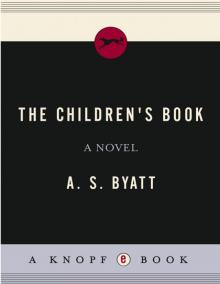 The Children's Book
The Children's Book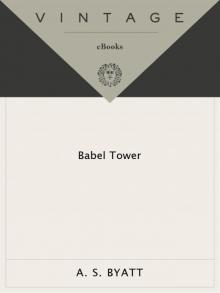 Babel Tower
Babel Tower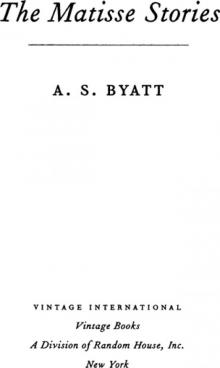 The Matisse Stories
The Matisse Stories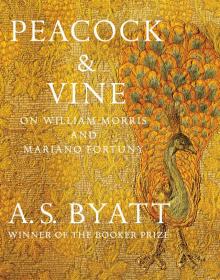 Peacock & Vine: On William Morris and Mariano Fortuny
Peacock & Vine: On William Morris and Mariano Fortuny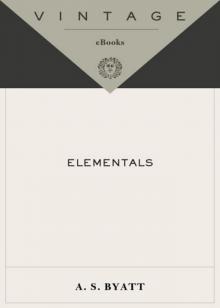 Elementals: Stories of Fire and Ice
Elementals: Stories of Fire and Ice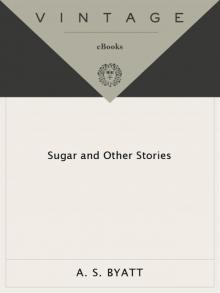 Sugar and Other Stories
Sugar and Other Stories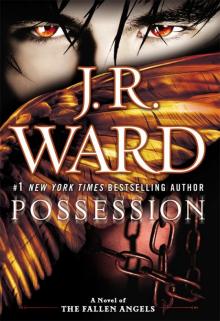 Possession
Possession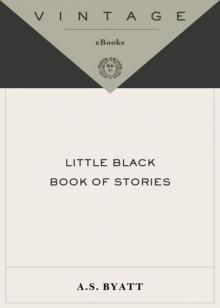 Little Black Book of Stories
Little Black Book of Stories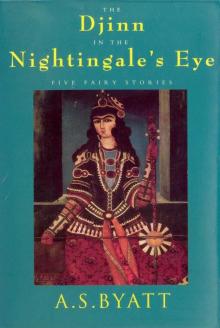 The Djinn in the Nightingale's Eye
The Djinn in the Nightingale's Eye The Virgin in the Garden
The Virgin in the Garden The Game
The Game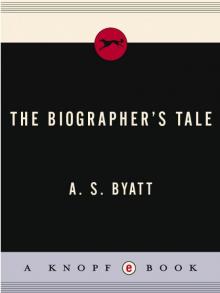 The Biographer's Tale
The Biographer's Tale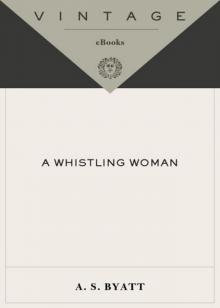 A Whistling Woman
A Whistling Woman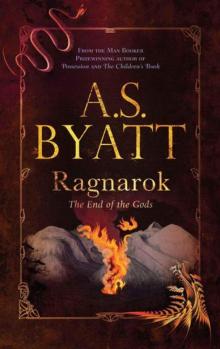 Ragnarok
Ragnarok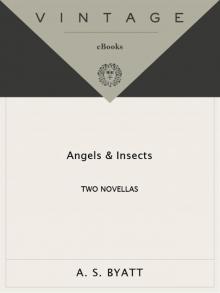 Angels & Insects: Two Novellas
Angels & Insects: Two Novellas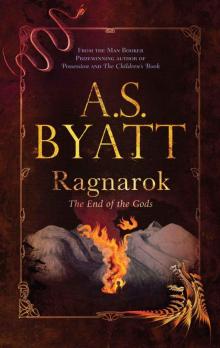 Ragnarok: the End of the Gods (Myths)
Ragnarok: the End of the Gods (Myths)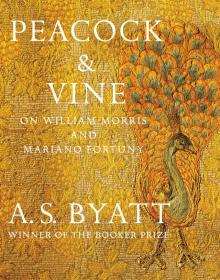 Peacock & Vine
Peacock & Vine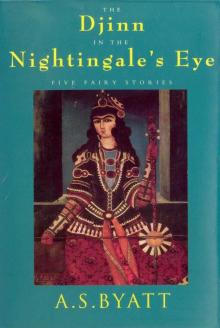 The Djinn in the Nightingale's Eye (Vintage International)
The Djinn in the Nightingale's Eye (Vintage International)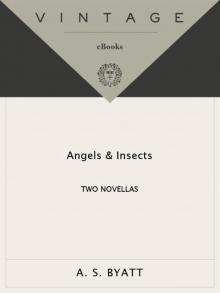 Angels and Insects
Angels and Insects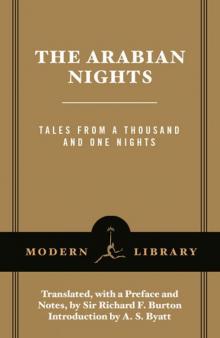 The Arabian Nights: Tales from a Thousand and One Nights (Modern Library Classics)
The Arabian Nights: Tales from a Thousand and One Nights (Modern Library Classics)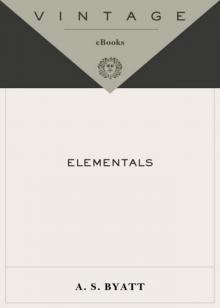 Elementals
Elementals